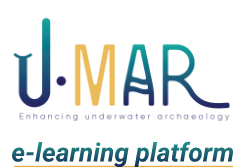
Programme: Erasmus Plus Programme.
Key Action: KA220-VET – Cooperation partnerships in vocational education and training
Horizontal priority: Environment and fight against climate change
Total Project Duration: 10 January 2022 – 09 January 2024 (24 months)
Consortium: 7 partners from 5 countries
Coordinator: The Phoenicians’ Route (Italy)
Total Budget: €2.79 million

U-Mar promoting Enhancing underwater archaeology to make it an innovative tool for developing sustainable & creative tourism is a KA220-VET – Cooperation partnerships in vocational education and training – project co-funded by Erasmus+ Programme of the European Union.
The general aim of the project U-Mar is to develop the knowledge and the valorization of heritage related to underwater archaeology

• Training professional figures with specific skills in underwater archaeology, how to valorize it and how to manage these cultural sites. The project will therefore train new experts capable of fostering the touristic offer of these sites from multiple points of view, by setting up an ad hoc innovative training course.
• Developing sustainable and environmentally friendly tourism around underwater archaeology, improving the tourist-cultural offer and expanding the reference target of users. These objectives will be reached also by making underwater archaeology more accessible to people not willing or not able to dive or swim, by creating digital pathways to the sites and by developing interpretation centres on land.
• Provide guidelines for organizations that want to develop strategies for enhancing the underwater archaeological heritage, with different possibilities of application depending on the context and with a particular focus on the creation of underwater archaeological itineraries, with their specific heritage and on the professional’s skills required.
• Increase knowledge of the underwater archaeological heritage and the importance of its conservation and enhancement, not only by tourists, but above all by young people and local communities living in those territories.



Project code: KA220-VET35D63F80
Project funded by the Erasmus+ Program through the European Union.
However, the views and opinions expressed are solely those of the authors and do not necessarily reflect those of the European Union or the European Education and Culture Executive Agency (EACEA). Neither the European Union nor the EACEA is responsible for them.